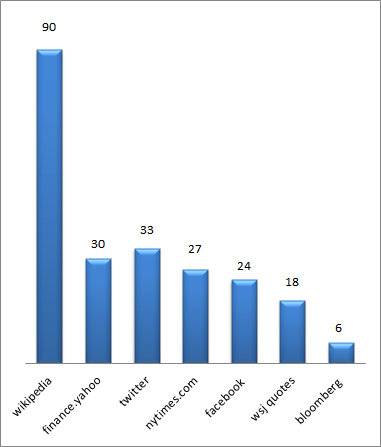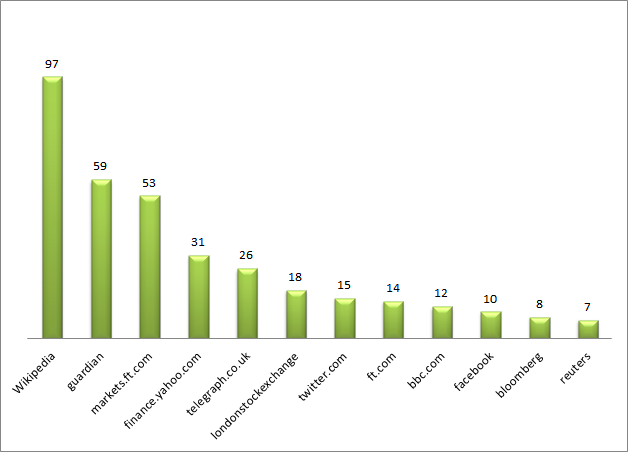Brand Reputation for the FTSE 100 vs. the Fortune 100
Before we can start work aligning a brand’s online reputation to match their corporate objectives, we need to understand something about the playing field.
We need to understand what types of results are typical for brands in the same market. Many of our clients are Fortune 100 and Fortune 500 companies, so we have done extensive research into this market.
Below is a table depicting the frequency with which we find various sites as top ten results in Google’s natural search results. (Data is from Nov 9, 2012).
The number above each bar represents the number of company search results in which each website appears.
As you can see from this chart, the most prevalent result for companies in the Fortune 100 is Wikipedia – appearing in 90% of page one results for Fortune 100 companies.
It’s interesting to note that Facebook and Twitter are each appearing in F100 first page Google results about 25% of the time.
Also interesting is that Yahoo Finance continues to be an important finance site as compared to Google Finance – which does not show up in the top ten.
A takeaway for companies in the space would be to look at the frequently occurring websites and determine if your brand should also have similar results. Knowing that Google tends to “like” showing a specific type of result seems to make it low-hanging fruit – an easy win if it’s something that will help your online reputation.
What about the FTSE 100?
In preparation for a week of meetings in London, we decided to compare the same type of data as seen in Google.co.uk results for the FTSE 100.
In the UK, Wikipedia is even more prevalent. Only 3 FTSE 100 companies have no Wikipedia page appearing in their Google page 1 results! Also noteworthy is the strength of The Guardian as a result shown in the first page Google results for 59% of all FTSE 100 companies! (Note to PR department – The Guardian is more likely to impact online reputation than the BBC, The Telegraph and Reuters combined!). In the UK Markets.ft.com outranks Yahoo Finance in prevalence by a significant margin, with Yahoo Finance still maintaining a significant foothold.
On the social media front, Twitter and Facebook are less than half as likely to be in the Google first page search results for a FTSE 100 company – as compared to a Fortune 100 company.
Notable as well is that neither group has video results coming up with any frequency. Image results show up in 6 of the FTSE 100 search results, but in only 2 of the Fortune 100 first page results.
With this knowledge, we are better prepared to look at FTSE 100 companies – and indeed at company results for other companies in the UK with a better understanding of which sites play significant roles in online reputation. When we approach a client program, we then take the additional step of doing a more exact comparison of the peer group – the companies or individuals that are most similar to the client. This offers further insight as to the way in which Google treats those keywords within the local search market.


